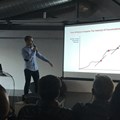According to The State of Influencer Marketing 2018 by Launchmetrics, almost 80% of professionals have implemented an influencer campaign over the past year - 90% state it is effective for building brand awareness and 69% believe it boosts sales. But perhaps the most interesting statistic is that 46% of professionals believe that they get better results when they work with the micro-influencer.
More authentic experts
The smaller profiles, who focus tightly on their areas of passion and expertise with a carefully crafted niche audience who is highly engaged, are delivering greater results for advertisers. Micro and mid-tier influencers differ in size from market to market. In more mature markets such as the USA, for example, micro-influencers could be someone with around 50k followers. In South Africa, that following would be already positioning the influencer on a larger scale.
The micro-influencer has a smaller, but more engaged, audience than the majority of social media stars or traditional celebrities. They are simply seen as being more authentic experts in their niche – be it a vegan YouTube Chef or a yoga instagrammer. This makes them a much more reliable source of recommendation. The micro-influencers talents are a perfect showcase as to why word of mouth on digital channels can be so powerful.
Data is slowly surfacing on the results micro-influencer campaigns are achieving. They have around 60% higher engagement, they are 6.7x more cost-efficient per engagement, and they have 22.2% more weekly conversions than the average consumer, according to AdWeek. These influencers tend to have conversations with their audiences, taking the time to respond and comment and follow people back. For these reasons the practice of leveraging micro influencers is really gaining traction.
Authenticity and trust
These qualities are the reasons behind why the micro-influencer adds value. They have authenticity and trust – posting their own content, replying to comments themselves (not using teams) and they are often seen as more real than brands or celebrities.
It can be difficult for a celebrity to be authentic as there’s a disconnect between common or everyday products and services that the average person uses versus what a celebrity might consider or use. Micro-influencers are like everyone else and their recommendations are more insider tips or a friend’s trusted reference than a brand push.
The audience of a micro-influencer is more targeted and there is less chance of duplication. Celebrity and star influencers have a higher chance of having the same followers due to their mass appeal which means brands are paying multiple times to reach the same people. The latest algorithm changes on Facebook have also added value to the micro-influencer.
Higher reach, higher engagement and affordable
Facebook’s changes lean towards favouring the micro-influencer as posts of friends and family are given greater priority over brands and publishers. This means that the potential reach for a micro-influencer should be, in practice, much higher.
From a value perspective, micro influencers are just more affordable than celebrities as they do not command the same high dollar extremes. That said, there is an opportunity to leverage technology to deploy tend or to hundreds of micro-influencers. This will deliver the same reach, with higher engagement and a much higher volume of content being generated.
In South Africa, many brands still lean towards the celebrity over the mid and micro tier influencer. However there remains month on month growth in requests to find out more about campaigns with mid and micro influencers, and in actual campaigns being booked - this is one trend that’s emerging strongly in South Africa.






















































